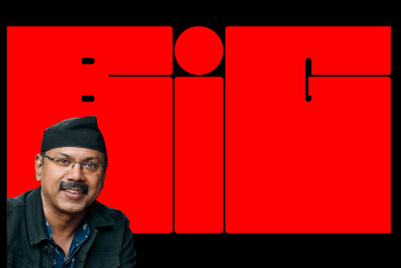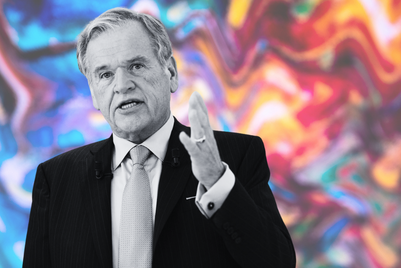
It had always been Delmus Credle’s dream to work at BBDO, and the timing was perfect. Born in South Korea to expat American parents, Credle studied law at the University of Virginia before switching to advertising in pursuit of a more creative career. Building his experience, he worked as a strategic planner at Ogilvy in New York, McCann in San Francisco and Publicis in Seattle. Credle was heading up the planning department at the consultancy Sensis in Los Angeles when a Grace Blue recruiter called, back in 2016.
The role—head of planning at BBDO Shanghai—felt “kind of perfect” to Credle; and he seemed to be an ideal candidate. He had made regular business trips to China, specifically to Shanghai, for Ogilvy and had always wanted to take on an international role. He also liked the idea of living closer to his home town of Seoul. Grace Blue performed a lengthy vetting process Credle describes as “rigorous”, and he asked plenty of his own questions before committing to the move. The courtship complete, Credle signed the contract and moved to Shanghai to begin his new job in January 2017.
The problems—which led to him delivering his resignation after just 12 months—started soon after he joined BBDO, he claims. At first, Credle says he assumed they simply came with the territory of moving across the world and starting a new job in an unfamiliar region.
“There were constant challenges,” Credle tells Campaign Asia-Pacific in an exclusive interview. “China itself, I think it should go without saying, is a really difficult place to work, for anybody, and if you are a foreigner it is really hard.”
They literally sat there and outed me in front of a client... I really thought I had gone to the twilight zone. It was thoroughly degrading, it was thoroughly humiliating.
Credle alleges that he tried to be understanding about the unfamiliar behavioural norms he encountered. “I was very culturally sensitive. On top of a tough job I had this level of awareness, this kind of compassion about being the outsider.”
Still, Credle claims he regularly felt uncomfortable about comments people made to him in the office, frequently related to his nationality or ethnic origins. A Korean-American, Credle's skin colour is dark. He says he was reminded “at least two or three times a day” that he “wasn’t Chinese, that China was somehow terminally unique”. In one instance, he returned from a colleague’s wedding in Malaysia looking darker-skinned than usual after being in the sun. “I walk in and this young account woman, she looks at me and she smiles and then she has this puzzled look on her face and she goes 'you look different'. And I'm like, ‘yeah, well I just got back from Malaysia.’ And she was like ‘no, you just look blacker.’”
This kind of occurrence was “difficult”, says Credle, “but I was willing to kind of let it go.” There were also plenty of unspoken social rules about his new job, he says, that no one would tell him about until he ended up breaking them. When he sat next to the CMO of a company with whom he found he had a connection in a pitch, for example, he didn't realise that seats were "very strictly assigned" according to hierarchy.
“Business as usual in China I think for a foreigner, for a Westerner, would send most people into shock or outrage,” says Credle. A sense of humour was essential, he felt, and mostly he managed to make light of any comments he found offensive.
But where Credle started to feel truly uncomfortable concerned remarks which he says were made to him by his executive management level, specifically by Tze Kiat Tan, the CEO of BBDO China. He claims that he felt excluded from what he describes as a kind of management club, complete with “weird cronyism”, from the very beginning, he says.
“I was the newest member of the management team but they had all been together for ten years. They were all...what I would classify as first wave expats. They are from Asia—Singapore, Taiwan, Malaysia and the Philippines—and they are close. Their kids go to school together, they are friends, and I was the newest member of that. There’s a kind of loyalty that prevails.”
|
Editor’s note: We hope this article will ignite a debate about what it can be like to work in cultures that aren’t native to you. We invite any comments and feedback about expatriates’ experiences of working in advertising and marketing in Asian regions. In working abroad, have you ever experienced or witnessed what you feel to be be unacceptable discriminatory behaviour based on your nationality, ethnicity or sexual preferences? Are some markets more challenging for expats than others? Are there some cultural norms that expats simply need to accept, even if they make them feel uncomfortable? Tell us your views—anonymously if you wish—using the feedback form or by emailing [email protected]. |
Credle admits that he felt he and Tan, known as ‘Z’, never clicked. “I don't know that the CEO and I ever really had a lot of love for each other,” he says.
“I thought to myself ‘there must be some way I can build a relationship with her’. And actually it was that situation where I brought in brands from an existing client that I thought would sort of gain her favour. Sadly I think it actually had the opposite reaction.”
Credle claims that despite facing a 60% reduction in staff in his first few months, when the agency’s Mars business split off, he managed not to lose any accounts, won every pitch he was involved in and was, he claims, solely responsible for winning new business from existing clients, including adding the ‘premium water’ business from client Kang Shi Fu to BBDO’s roster. Tan later sent an internal email, seen by Credle, saying BBDO had won a pitch for this business, even though, according to Credle, “there had never been a pitch”.
According to Credle, things then got uglier, and more personal. Credle says that Tan began to mention his nationality almost “every single time” they spoke. “We'd be having a conversation where she'd ask me to meet someone or have lunch with someone or do something, but then at the end of it she would just sort of randomly and very pejoratively mention that I was American and I was like ‘how does that, what does that have to do with anything?’ And then it progressed into being Korean.”
Another time, Credle states, he and Tan were in a lift returning to the office following a launch to celebrate BBDO winning the Darlie toothpaste business. The brand has a history of association with racism, having changed its name from ‘Darkie’ in all markets except China decades ago following controversy surrounding both the name and the logo, which featured a dark-skinned black male with very white teeth. The Chinese brand name, however, still translates as “Black Person Toothpaste".
Credle claims Tan told him the brand wasn't racist, in remarks he felt were pointedly personal. “She goes ‘let me ask you, as a black person, how do you feel about that logo?’ And before I could even say anything she cuts me off and goes ‘you know what, let me tell you something. That logo, for Chinese people it really just represents clean taste. You know the toothpaste just tastes really, really clean and that's what it represents. It's not racist at all.’”

The discrimination to which Credle claims he was subject didn’t only take place in private, Credle alleges: at one management meeting, he says Tan walked around the room shaking hands with everybody to thank them for their work, deliberately missing him out. On another occasion, which Credle describes as “thoroughly humiliating”, he and Tan were at a lunch with the CEO and other staff members from Kang Shi Fu when Credle says Tan “outed” him publicly, despite never having had a personal conversation with Credle about his sexuality.
“They literally sat there and outed me in front of a client. They were talking about, you know, ‘do you have a boyfriend?’ and ‘where is he?’ and ‘what does he look like?’ and ‘is he cute?’ and they just—it was like... I really thought I had gone to the twilight zone. It was thoroughly degrading, it was thoroughly humiliating.”

BBDO China confirms that Delmus Credle was under our employment from January 2017 to January 2018. At the time he was head of planning at BBDO Shanghai, the decision to leave the agency was his.
BBDO China is committed to ensuring a working environment that is inclusive, safe, and respectful for all our employees. We do not tolerate unlawful harassment of any kind.
Credle makes it clear that he did raise initial concerns about how he was fitting into the role during his probation period.
“I had already said to them months earlier, ‘Look, I feel like there is something a bit off and we're in the probation period so if I am right about this why don't we just call it quits?’ I made it so easy for them, and they didn't do that. I think that they chose instead to make me miserable.”
He also says he hoped to “go quietly”, when he resigned, in January this year, feeling he could no longer take an equivocal view of the intolerance he had experienced. But when he stated that he didn’t feel comfortable attending ‘Open’, Omnicom’s diversity initiative, for which Credle had been appointed the ‘BBDO person’, he felt the BBDO team began to “punish” him.

“They walked in [to my office] within a 20-minute period, a couple of the management team walked in saying how sad they were that I was leaving but that I was going because I was too nice and way too soft to deal with China, which is so offensive.”
Credle followed up with JC Catibog, managing director of BBDO South China, once he’d left the company, sharing his concerns to try to ensure someone else didn’t have the same experience, he says—but he received no response. Now back in the USA looking for new roles, Credle says he was inspired to speak publicly—he published the above series of Tweets before speaking to Campaign Asia-Pacific—partly because of the #MeToo movement, which has encouraged many people to be open about their experiences of sexual harassment, and partly because he feels real change at BBDO and the wider industry in China is needed. (Credle makes no claims of being the subject of any sexual or racial harassment whilst at BBDO).
“I do think that on a practical level, they need to give more than lip service to being open to foreigners. They really need a support system for someone like me.”
He makes it clear he doesn’t want to pursue a legal battle with BBDO, and that he doesn’t think Z or any of the managers are inherently racist or “malicious”. His reasons for speaking out, he says, are more to do with starting an honest conversation about diversity than personal retribution.
“Any loss of face or pride or reputation or any of these things that matter in Asian culture are secondary to the fact that I think at the minimum people should know,” says Credle. “There was something different every day that I had to figure out. I just wanted to go to work and do my job.”
“I admire Z and Hans [Lopez-Vito, chief strategy officer, Greater China at BBDO Proximity] and the management there, but I do feel like their closeness over the years, as well as the isolation of China, has detached them a bit.”
“I am doing this because I want the truth out there.”
|
HAVE YOUR SAY
Want to comment on this article? We welcome all feedback and views. Please email [email protected]. We will preserve anonymity in any follow-up articles if requested. |
(This article first appeared on CampaignAsia.com)



.jpg&h=334&w=500&q=100&v=20250320&c=1)
.jpg&h=334&w=500&q=100&v=20250320&c=1)


.jpg&h=334&w=500&q=100&v=20250320&c=1)


.jpg&h=334&w=500&q=100&v=20250320&c=1)
.jpg&h=334&w=500&q=100&v=20250320&c=1)




.jpeg&h=268&w=401&q=100&v=20250320&c=1)
.jpg&h=268&w=401&q=100&v=20250320&c=1)
.jpg&h=268&w=401&q=100&v=20250320&c=1)


